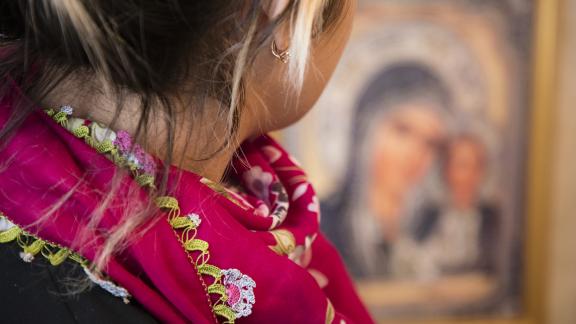Dina was just 15 years old when she married her husband, and 16 years old when she had her first child. “It was young. Getting married at this age is bad, because you are still a child,” she says, sitting on the sofa and clutching a teddy bear. Like the majority of Georgians, she is an Orthodox Christian, and the walls of her home are covered in paintings and photographs of religious icons: Jesus, St. Mariam and St. George.
Now 32 years old, she describes how after the birth of her first child she discovered she was facing an unintended pregnancy. “Because of financial problems I decided I couldn’t afford to have another child,” she says.
Dina lives in a small house just outside of Senaki, a town in western Georgia facing economic hardship according to Nino Shurgaia, a youth leader working with IPPF member HERA XXI to provide sexuality education and sexual and reproductive health care to women in the region. “This is an area for agriculture and subsistence farming: there are few opportunities for income generating activities. People can’t afford to raise children, or to have more children when they already have some to support,” she says.
Dina and her husband were using condoms to try to prevent pregnancy after the birth of their first child, but they weren’t always able to afford them. The government’s failure to ensure contraceptive care and sexuality education is hugely harmful to vulnerable communities in the region, according to Nino. “People do not have access to contraception and reliable information,” she says.
Women in Senaki and the surrounding regions face stigma and discrimination from the local community when they decide not to move through a full pregnancy. This leads to some internalising feelings of shame. “You feel bad, and it was really hard for me to make the decision,” says Dina, who also struggled to reconcile her decision to have an abortion with her faith. On top of that, doctors frequently fail to offer compassionate counselling or support. “There was not even any explanation of the process.” Luckily, Dina was able to rely on a close friend she could talk to.
Click to read our blog series on obstacles to abortion care and women's reproductive freedom in Georgia.
Photo credit: Jon Spaull/IPPF EN
when
country
Georgia
Subject
Abortion Care
Related Member Association
Association HERA XXI - Georgia









